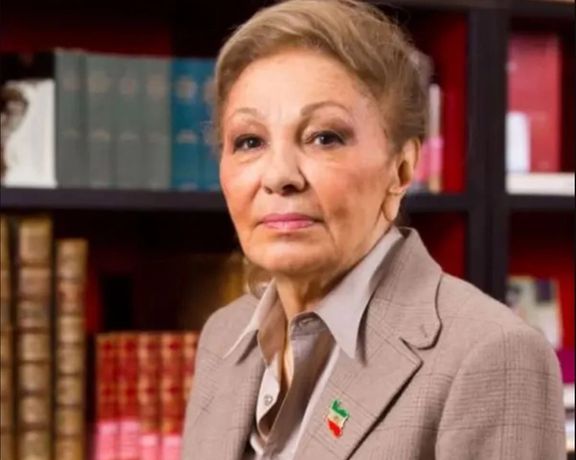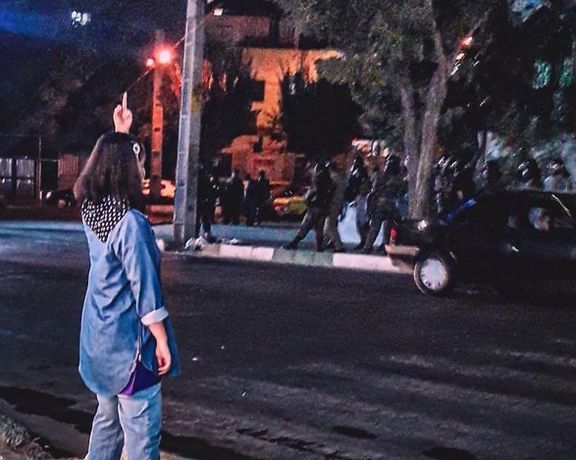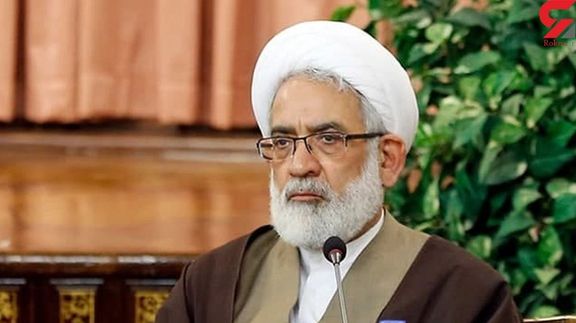Iran’s Exiled Queen Salutes Bravery Of People Against Regime

Iran’s exiled queen Farah Pahlavi has lauded popular protests against “forces of darkness” and decried “the harrowing savage crackdown” on rallies triggered by the death of Mahsa Amini.

Iran’s exiled queen Farah Pahlavi has lauded popular protests against “forces of darkness” and decried “the harrowing savage crackdown” on rallies triggered by the death of Mahsa Amini.
In a message released on Wednesday, she described as devastating the murder of the 22-year-old woman, who was fatally injured in custody of hijab police, as well as many other people who were killed during the Islamic Republic’s crackdown on the protests.
Expressing her compassion and condolences to the bereaved families, she said, “Though heavyhearted, I take strength in seeing Iran back on its feet and rising up against ferocious forces.”
“Our youth yearn and deserve to live in the era in which they are born, and I proudly salute their bravery, sacrifice and struggle for freedom and equality," she said.
She also called on “all factions of the security forces, the Army, the Pasdaran (Revolutionary Guard), the Basiji, the plainclothes agents and others... to refrain from shedding the blood of their young compatriots,” adding that “Light will prevail upon darkness.”
Last week, her son, exiled Prince Reza Pahlavi told Iran International in an exclusive interview that "The army is the guardian of the country and its borders, but today there is a situation where the internal enemy is shooting at the people... the military forces should be a shield for the defenseless people," calling on security forces to join the people and stand against the Islamic Republic’s repression machine.

At least 185 agents from Iran’s Basij paramilitary forces, which is affiliated with the Revolutionary Guard, have been injured during clashes with protesters just in the capital Tehran.
Hasan Hasanzadeh, the commander of Tehran's Mohammad Rasulullah unit -- the biggest IRGC’s division which has been praised by the authorities for suppressing popular protests in previous years -- said on Wednesday that the skull of one of their forces was broken and "five of the Basijs are now in the ICU."
While he said none of the Basij fighters were targeted by firearms, he claimed that the protesters "were armed".
Iran is engulfed in unrest and chaos following the death of a young woman who died in custody of hijab police. People in numerous cities are holding daily antigovernment protests while workers unions, including teachers as well as students' associations of several universities have announced strikes. The crucial oil sector workers also threatened a strike on Wednesday.
Iran Human Rights (IHR), a monitoring group based in Oslo, Norway, said Monday that at least 76 protesters have been killed by security forces as of Monday, while unofficial social media sources are reporting much higher numbers.
Earlier in the day, Iran’s Judiciary issued a directive to courts to act “decisively”and issue harsh sentences to many of those arrested during the ongoing anti-regime protests.

Spain summoned the Iranian ambassador Wednesday to convey Madrid’s “absolute condemnation” of the Islamic Republic's violence against peaceful protestors.
Spain summoned the Iranian ambassador Wednesday to convey Madrid’s “absolute condemnation” of the Islamic Republic's violence against peaceful protestors.
According to a diplomatic source on Wednesday, “The foreign ministry has summoned the Iranian ambassador in Madrid to express its objection over the repression of the protests and the violation of women’s rights.”
Spain, in particular, expressed its "abhorrence of the violence against Iranian women and their rights,” read a foreign ministry statement.
The Spanish ministry also urged Iran to carry out "an independent investigation (into the bloodshed) and to establish responsibility in a transparent, objective and thorough manner" while "ending all arbitrary arrests" of journalists and other citizens exercising their civic freedoms.
On Monday, Germany called in the Islamic Republic’s envoy in Berlin over Tehran’s heavy-handed crackdown on the popular protests, triggered by the death of Mahsa Amini, the 22-year-old Kurdish girl who died due to several blows on her head in the hands of hijab police.
On Sunday, the EU foreign policy chief slammed Iran’s handling of protests as unjustifiable and unacceptable, hinting that the European Union may issue sanctions over the crackdown.
In a statement on behalf of the EU, Josep Borrell,called on the Islamic Republic “to immediately stop the violent crackdown on protests and ensure internet access, as well as the free flow of information.”
“The European Union will continue to consider all the options at its disposal ahead of the next Foreign Affairs Council, to address the killing of Mahsa Amini and the way Iranian security forces have responded to the ensuing demonstrations,” read the statement.

Iranian activists are campaigning for nationwide strikes as a next step in their protests, while student in two dozen universities say they will boycott classes.
The “NationwideStrikes” hashtag has started trending on Twitter since Tuesday. Campaigners say protests against the regime will only succeed if businesses, students and civil servants go on strike and paralyze the system as they did in the Revolution of 1979 which overthrew the monarchy.
In the past few days student groups in many universities have issued statements saying they will refuse to attend classes in protest to the arrest of their classmates and others on the streets, and violation of their right to peaceful protests. Students have also urged their professors to condemn government violence and boycott classes until all detained students are freed.
A statement issued by a group of students at Tehran Medical Sciences University condemned government violence against protesters and use ambulances for transporting security forces and detainees in the protests.
The Iranian academic year started September 23, but authorities have cancelled all classes at several major universities this week including Tehran University. Monday and Wednesday were also public holidays in Iran where the week starts on Saturday, but these have not stopped students from staging big rallies on campuses.
Authorities have offered online classes although the government has shut off or slowed down internet access since the protests began nearly two weeks ago and have also arrested dozens of students on campuses and at their homes.
Students often chant “Women, Life, Freedom” -- which has become the signature slogan of the protests -- and demand the release of all political prisoners, freedom, and even shout against the regime and its Supreme Leader Ali Khamenei.
On Wednesday students protesting at Shiraz Medical Sciences University complemented the signature slogan with a new one: “Men, Homeland, Progress”. They also chanted “We Will Fight, We Will Die, We Will Take Iran Back!” as well as slogans against clerics. Students chanted “Scoundrels, Scoundrels” when security forces attacked their rally and booed them.
Political figures, including Iran's exiled Prince Reza Pahlavi, artists, and activists abroad have also been encouraging strikes aimed at toppling the Islamic regime.
Unlike 2019, the Revolutionary Guard (IRGC) has so far not been directly deployed on the streets, leaving the matter to the Police and it's anti-riot units to deal with protesters in over 100 cities and towns across the country.
Protesters have waged a war of attrition against the security forces by protesting mainly in smaller groups, much like flash mobs, in various neighborhoods every night. Tehran police have been deployed "24 hours a day" and many have had little sleet, said the Iranian judiciary chief, Gholamhossein Mohseni Ejei, during a visit to the headquarters of Tehran Police Sunday, in a video posted by the Judiciary’s official website, Mizan Online.
Rumors abound that Khamenei is seriously ill and some claim that his health situation has prevented the security forces from using a heavier hand to quell the protests.
Khamenei who has not appeared in public since September 21 did not make any mention the protests in a speech to military commanders and to the death in custody of Mahsa Amini, the young woman whose death sparked the demonstrations nearly two weeks ago.
The uprising has already affected the livelihoods of millions of Iranians who run online businesses or use Instagram. Authorities blocked access to Instagram, the only major social media platform not blocked in Iran before the protests, and have consistently resorted to intermittent internet blackouts to prevent people from communicating and sharing footage of protests.

Human rights group Amnesty International has launched a petition to set up an independent UN probe into the Islamic Republic’s killings and crackdown of protesters.
Amnesty has called on the international community to take action now, urging everyone to sign the petition and call on states to set up an independent UN mechanism now to investigate and ensure accountability for the most serious crimes under international law in Iran.
International reactions are coming everyday over the nationwide protests sparked by the death of 22-year-old woman, Mahsa (Zhina) Amini, who was mortally wounded in the custody of hijab enforcement police. An eyewitness told Iran International that Mahsa had told her in a detention room that an officer had hit her on the head.
On Wednesday, the UN Secretary General’s spokesman said, "We are increasingly concerned about reports of rising fatalities, including women and children, related to the protests across Iran,” calling for “prompt, impartial and effective investigation" into Amini’s death.
The Australian foreign ministry said in a statement, “The Australian government condemns the deadly and disproportionate use of force against protesters in Iran, following the tragic death of Mahsa Amini.”
“We have raised concerns into circumstances surrounding her death in custody with the Iranian Embassy in Canberra,” it added, saying, “We’re alarmed by reports that dozens of people have been killed and many more injured, including teenagers, during heavy-handed measures Iranian authorities have implemented to crackdown on the protests. We call on Iran to exercise restraint.”

Iran’s Judiciary has issued a directive to courts to act “decisively” and issue harsh sentences to many of those arrested during the ongoing anti-regime protests.
The general Prosecutor’s office headed by a notorious hard-liner cleric; Mohammad Jafar Montazeri issued the directive while thousands have been arrested since September 16 when the first protests began in Iran. At least 3,000 are in detention according to some estimates, but the true number may never be disclosed.
In the previous round of antigovernment protests in November 2019, around 10,000 people were arrested and many faced summary trials without due process of law, without their own lawyers and behind closed doors.
Montazeri’s directive to courts in of itself is an oxymoron, since he is the prosecutor, not chief justice or minister of justice. Iran’s legal system is based on a convoluted and improvised interpretation of Islamic Sharia, where there is no clear distinction between the prosecution and courts. The latter are controlled by the Judiciary, an extensive bureaucracy which also arrests people and directs prosecutors.
The Judiciary in turn is under the direct control of Supreme Leader Ali Khamenei who has ruled the country for the past 33 years. Judges and prosecutors are all appointed by the chief of Judiciary, an official handpicked by Khamenei.
Montazaeri in his directive offers some leniency toward those whose participation in the protests cannot be evidenced by prosecutors and courts, and who have no prior record, including activism on social media. Even this token measure of leniency can be meaningless since prosecutors routinely claim to have evidence and judges rarely dispute them.
But when it comes to those that the regime considers protesters, Montazeri’s directive is harsh.
“Those who have killed or wounded security agents, or destroyed public and private property, those who have attacked military and police centers, those with a record of taking part in previous unrest, thugs and criminals who have encouraged rioters, and foreigners who have been involved in protests should be held in prison until the court convenes and maximum punishment should be requested for them if there is evidence about what they did.”
In one paragraph the directive clusters together a wide range of real crimes with expressions of political dissent and demands maximum punishment.
Clashes have taken place between protesters and security forces, who have so far killed dozens of people. Some police and anti-riot troops have been wounded or even killed and this can be easily considered a crime. But the judicial system will use these charges against any protester it wants, with no recourse to a fair trial or appeal.
The directive also allows prosecutors to hold any person indefinitely and past instances show that torture and pressure will be freely used to extract self-incriminating confessions.
The Islamic Republic rarely issues permit for rallies, except to its own supporters who do not need a permission anyway. Therefore, all antigovernment protests can be deemed illegal, and protesters can be confronted by security forces and plainclothes Basij militia armed with clubs, knives and guns.
Often, protesters have no other choice but to defend themselves against the police and Basij members who come to disperse and stop rallies.
Montazeri’s directive is also aimed at intimidating a new generation of protesters who have not been cowed after more than ten days of daily confrontations with security forces.